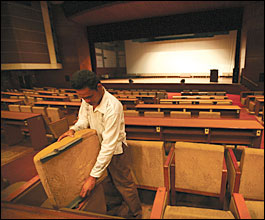|
|
| HALLMARK: A worker repairing seats at the BICC on Wednesday. Microphones need to be fitted and seating capacity expanded for the constituent assembly. |
After the Election commission officially announces the results of the elections with the PR list this week, the 601-member constituent assembly will have three weeks to meet. Besides the logistical problems, there are also legal hurdles that have to be crossed by 25 May.
The Chinese-built Birendra International Convention Centre (BICC) is being requisitioned to serve as the assembly hall and the Parliament Secretariat is racing against time to refurbish it. BICC's Sagarmatha Hall has a capacity to seat 1,004 people, but many of the seats are broken and they need to be fitted with microphones.
An extra 84 seats will have to be added on the main floor so all members can sit together. The nearly 500 seats in the balcony are being set aside for officials, observers and the media. Security arrangements, walk-through gates, administration and information centres need to be in place by 20 May.
However, since UNMIN occupies seven of the nine smaller conference rooms at the BICC, there is no space left for the secretariat and the CA's various committees. Each political party needs an office, and there are 25 parties compared to 11 in the previous parliament.
"Our secretariat will stay at Singha Darbar, there is just no space at BICC," said Joint Secretary Mukunda Sharma.
Then there are the legal issues. The new members need to be sworn in before they take up seats, but who is going to swear them in? As a stopgap, the oldest member of the assembly, 73-year-old Kul Bahadur Gurung may chair the inaugural session. But who will swear him in?
The first session of the assembly is supposed to formally abolish the monarchy, but it may be tied up with procedural and legal issues.
House speaker Subhas Nembang told Nepali Times his secretariat is drafting the laws, and this will be passed by ordinance at the first meeting. But the cabinet is barely functional, with seven UML ministers having resigned en masse.



